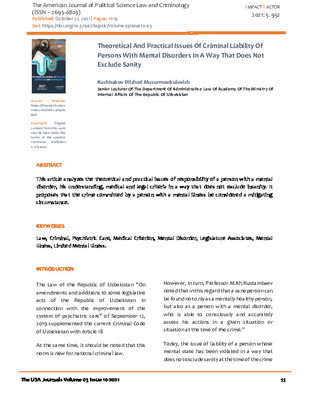Theoretical And Practical Issues Of Criminal Liability Of Persons With Mental Disorders In A Way That Does Not Exclude Sanity
Abstract
This article analyzes the theoretical and practical issues of responsibility of a person with a mental disorder, his understanding, medical and legal criteria in a way that does not exclude insanity. It proposes that the crime committed by a person with a mental illness be considered a mitigating circumstance.

Downloads
Senior Lecturer Of The Department Of Administrative Law

Keywords:
Abstract
This article analyzes the theoretical and practical issues of responsibility of a person with a mental disorder, his understanding, medical and legal criteria in a way that does not exclude insanity. It proposes that the crime committed by a person with a mental illness be considered a mitigating circumstance.
References
Course of criminal law of the Republic of Uzbekistan. Five volumes. 1 tom. General section. Crime Doctrine: A Textbook for Higher Education Institutions. Completed and revised second edition / M.Kh.Rustambaev, A.A.Otajonov et al. - T .: Academy of the Ministry of Internal Affairs of the Republic of Uzbekistan, 2018. - P. 197.
G.V. Nazarenko Insanity. Criminally relevant mental states. SPb., 2002. – P 112-134.
Xojaeva N.I., Shoyusupova A.U. Psychiatry. Textbook. - T., 2011. - P. 182.
Forensic medicine and psychiatry. Two volumes. Volume 2 Forensic psychiatry: S.A. Giyasov, J.I. Botaev, Ch.Sh. Saidov. Textbook. - T .: Academy of the Ministry of Internal Affairs of the Republic of Uzbekistan, 2011. - B. 46. Dushanov R.X. Psychology of the offender. Study guide. - T. : Academy of the Ministry of Internal Affairs of the Republic of Uzbekistan, 2011. – P. 8. Dolgova S.V. Features of the medical criterion of limited sanity. Bulletin of the Baltic Federal University. I. Kant. Series: Humanities and Social Sciences. - 2012. - No. 9. - P. 85-90.
Shamgunov A.N. The norm of criminal responsibility of persons with mental disorders that do not exclude sanity: problems of application in judicial and forensic psychiatric practice // Bulletin of the Chelyabinsk State University. - 2005 .-- P. 106-109.
Dolgova S.V. Features of the medical criterion of limited sanity. Bulletin of the Baltic Federal University. I. Kant. Series: Humanities and Social Sciences. - 2012. - No. 9. - S. 85-90.





